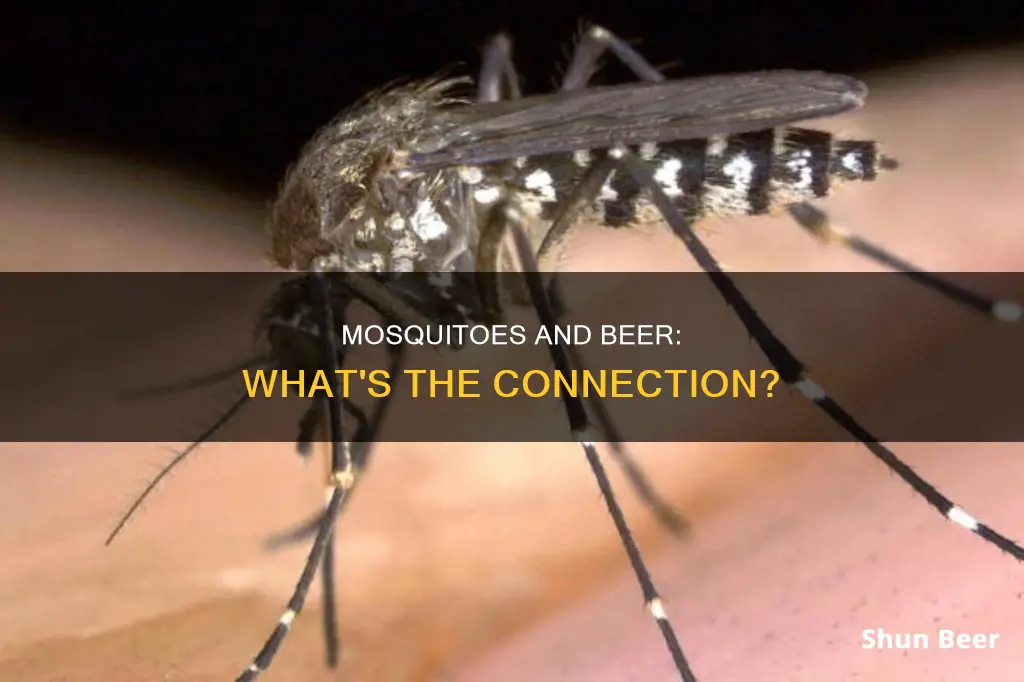
It's long been suspected that mosquitoes are more attracted to people who've been drinking alcohol, and now there's scientific evidence to back it up. A 2002 study by Japanese researchers found that people who drank beer were more likely to be bitten by mosquitoes, with the insects stimulated by the ethanol in the sweat of the drinkers. Other studies have also found that alcohol consumption can increase attractiveness to mosquitoes, though it's not just beer that's the problem – all alcoholic drinks can have this effect. So if you're planning on spending time outdoors, it might be wise to opt for a non-alcoholic beverage instead.
| Characteristics | Values |
|---|---|
| Alcohol consumption increases mosquito bites | Yes |
| Only beer increases mosquito bites | No, all alcohol consumption increases mosquito bites |
| Why does alcohol consumption increase mosquito bites? | It is unclear why, but it may be due to increased body temperature, increased sweat production, or the CO2 released from beer bottles |
| Number of subjects in the study | 13 |
| Control group | One person who did not ingest alcohol |
What You'll Learn

Ethanol ingestion increases mosquito attraction
It is a common belief that drinking beer makes you more attractive to mosquitoes, but is there any truth to this? Well, according to several studies, the answer is yes.
A 2002 study by the Journal of the American Mosquito Control Association found that the likelihood of being bitten by a mosquito is significantly increased by consuming alcohol. The study involved 13 participants who drank a bottle of beer, and it was observed that mosquitoes landed on them more frequently to feed. A similar study in Burkina Faso in 2010, this time with 18 subjects, supported these findings.
The reason behind this phenomenon is not entirely clear, but it is speculated that alcohol may raise the body temperature of drinkers and increase perspiration, making them more appealing to mosquitoes. This is because mosquitoes are drawn to carbon dioxide and octanol, a secondary alcohol produced by the breakdown of linoleic acid, both of which are exhaled when we breathe. Additionally, the carbon dioxide released from a beer bottle when opened could also be a factor in attracting mosquitoes that feed on mammals.
Furthermore, a 2011 French study found that the alcoholic equivalent of three cans of beer can lead to a 30% increase in mosquito bites for men in a controlled laboratory setting. While it is unclear why mosquitoes prefer those who have consumed alcohol, it is speculated that it could be related to warmer body temperatures. Interestingly, mosquitoes have been observed to feed on fermenting fruit and plants, which contain alcohol, suggesting a possible attraction to ethanol.
Despite these findings, it is important to note that the ethanol content in sweat and skin temperature did not show a direct correlation with mosquito landings in the 2002 study. This indicates that while alcohol consumption may increase the risk of mosquito bites, other factors such as body chemistry and genetics also play a role in mosquito attraction.
In conclusion, while ethanol ingestion may increase mosquito attraction, it is not the sole factor determining whether someone will be bitten. To reduce the risk of mosquito bites, it is recommended to use insect repellent, wear long sleeves and pants, and avoid drinking carbonated beverages during mosquito season.
Beer and Mucinex: Safe Mix or Health Risk?
You may want to see also

Mosquitoes are attracted to body odour
A study by Japanese researchers found that drinking a single beer increased mosquito attraction. The researchers compared a group of people who drank beer with a control group who drank water, and found that mosquitoes landed more frequently on those who had consumed alcohol. This increase in attractiveness to mosquitoes was attributed to body odour, as the ethanol content in sweat and skin temperature did not show a significant correlation with mosquito landings.
Another factor that may contribute to the attraction of mosquitoes is the ethanol excreted in sweat after consuming alcohol. While the amount of ethanol in sweat is minimal, it may still be detectable by mosquitoes and signal the presence of a potential meal. Furthermore, alcohol consumption may affect the odour of the skin by altering the chemical compounds present, making individuals more susceptible to mosquito bites.
According to Grayson Brown, a mosquito scientist and director of the Public Health Entomology Laboratory, the carbon dioxide that escapes from a beer bottle when opened can attract mosquitoes. Additionally, the lactic acid and bacterial colonies associated with sweating are strong attractants for mosquitoes, and they use artificial sweat as a lure in traps. The amount and type of bacteria on the skin can also influence mosquito attraction, with a greater diversity of bacteria potentially increasing the likelihood of bites.
In summary, mosquitoes are attracted to body odour, and alcohol consumption can increase the attractiveness of individuals to mosquitoes. While the exact mechanism is not fully understood, it may be related to increased body temperature, sweating, ethanol in sweat, and altered skin chemistry. To reduce the risk of mosquito bites, it is recommended to use insect repellent, wear long sleeves and pants, and avoid carbonated beverages during mosquito season.
Beer Left Out: Is It Still Safe to Drink?
You may want to see also

Beer is not the only alcohol that attracts mosquitoes
It is true that drinking beer can make you more susceptible to mosquito bites. A 2002 study by Japanese researchers found that drinking a bottle of beer increased mosquito landings on volunteers, compared to those who drank water. However, this is not just true of beer drinkers. The same study found that ethanol ingestion, regardless of the source, increased sweat production and raised skin temperature, making people more attractive to mosquitoes. So, if you're drinking cocktails, wine, or spirits, you're also at risk of attracting mosquitoes.
The ethanol we excrete when we drink alcohol may be a factor in attracting mosquitoes. A 2011 French study found that the alcoholic equivalent of three cans of beer can lead to 30% more bug bites in men. Similarly, a 2010 study in Burkina Faso found that mosquitoes were drawn to those who had been drinking, possibly due to the ethanol in their sweat. These findings suggest that any alcohol consumption can increase your attractiveness to mosquitoes, not just beer.
The carbon dioxide released from beer bottles when opened may also be a factor in attracting mosquitoes. Mosquitoes use carbon dioxide to locate their mammalian prey, and they can follow this scent from over 100 feet away. So, while drinking beer may increase your attractiveness to mosquitoes due to the carbon dioxide released, this is also true of other carbonated beverages.
While the exact reasons are still being studied, it is clear that alcohol consumption in general, and not just beer, increases your attractiveness to mosquitoes. So, if you're looking to avoid mosquito bites, it's best to opt for non-alcoholic, non-carbonated beverages or make sure you have good bug spray and protective clothing.
The Science of Beer: Foam Detectors Explained
You may want to see also

Mosquitoes are attracted to carbon dioxide
Drinking alcohol may increase your attractiveness to mosquitoes, as ethanol ingestion has been shown to increase sweat production and raise skin temperature, making you more susceptible to bites. This is supported by a 2002 study by the Journal of the American Mosquito Control Association, which found that the likelihood of being bitten by a mosquito was significantly higher for those who had consumed alcohol. A 2011 French study also found that the alcoholic equivalent of three cans of beer can lead to 30% more bug bites in men. However, it is important to note that the ethanol content in sweat and skin temperature did not show a direct correlation with mosquito landings in the 2002 study.
The carbon dioxide that fizzles out of a beer bottle when opened can also be an attraction factor for mosquitoes. Grayson Brown, a mosquito scientist and director of the Public Health Entomology Laboratory, states that the carbon dioxide coming out of a beer bottle will attract mosquitoes that feed on mammals. Therefore, if you want to avoid mosquito bites, it is recommended to avoid drinks that generate carbon dioxide, such as beer and soda, and opt for non-carbonated beverages.
Beer Beyond Best Before: Is It Safe to Drink?
You may want to see also

Alcohol may make your blood tastier to mosquitoes
It is a common belief that drinking alcohol makes you more attractive to mosquitoes, but is there any truth to this? Well, according to several studies, the answer is yes.
Japanese Study
A Japanese study published in the Journal of the American Mosquito Control Association in 2002 found that the likelihood of being bitten by a mosquito was significantly increased by the consumption of alcohol. The study involved 13 participants who ingested 350 ml of beer (or 12 oz, according to another source), while one person abstained. The researchers then observed that mosquitoes landed more frequently on those who had consumed alcohol compared to the person who had not.
French Study
Supporting this conclusion, a French study from 2011 discovered that the alcoholic equivalent of three cans of beer can lead to 30% more bug bites in men in a controlled laboratory setting.
While the exact reason is not yet known, one theory suggests that alcohol may raise the body temperature of drinkers and increase perspiration, making them more appealing to mosquitoes. Mosquitoes are attracted to carbon dioxide and octanol, a secondary alcohol created from the breakdown of linoleic acid, which we exhale when we breathe. Additionally, the carbon dioxide released from an open bottle of beer may also be a factor in attracting mosquitoes.
Furthermore, the ethanol excreted in our sweat when we consume alcohol could be a chemical signal that mosquitoes interpret as the presence of a potential meal. This hypothesis is supported by the findings of the 2002 Japanese study, which stated that "beer consumption consistently increased attractiveness to mosquitoes."
Other Factors That Make You Attractive to Mosquitoes
In addition to alcohol consumption, there are several other factors that can make you more attractive to mosquitoes. These include:
- Body temperature: Pregnant women, for example, tend to attract more mosquitoes due to their higher body temperature and increased carbon dioxide output.
- Blood type: People with Type O blood are more susceptible to mosquito bites, according to studies.
- Gender: Men are more likely to be bitten than women, possibly due to their larger size and higher body heat.
- Body size: Larger individuals tend to attract more mosquitoes because of their greater heat output and carbon dioxide production.
- Exhalation: Those who breathe heavily and exhale more carbon dioxide may be more attractive to mosquitoes.
- Genetics: Certain genetic factors can make some individuals more susceptible to mosquito bites.
Mixing Beer and Oxycodone: What's the Danger?
You may want to see also
Frequently asked questions
Yes, according to a 2002 study by the Journal of the American Mosquito Control Association, alcohol ingestion increases mosquito attraction. This is not limited to beer, as all alcohol consumption will make you more susceptible to getting bitten.
It is unclear why mosquitoes prefer humans who have been drinking alcohol. One possible explanation is that alcohol raises the body temperature of drinkers and makes them sweat more, both known factors that attract mosquitoes. Another theory is that the carbon dioxide (C02) released from beer bottles when opened attracts mosquitoes that feed on mammals.
According to a 2011 French study, the alcoholic equivalent of three cans of beer can lead to 30% more bug bites in men in a controlled laboratory setting.
Yes, in addition to alcohol consumption, mosquitoes are attracted to individuals with certain blood types, higher body temperatures, and increased carbon dioxide output. For example, a 2004 study found that people with type O blood were more likely to be bitten by mosquitoes compared to those with type B, A, or AB blood. Additionally, pregnant women, who tend to have higher body temperatures and carbon dioxide output, may also be more attractive to mosquitoes.







